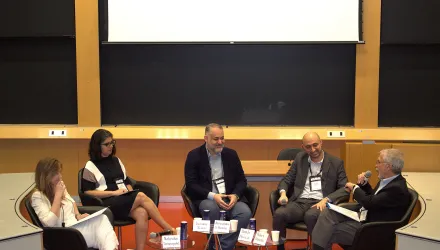"The global climate has changed and will continue to change as a result of greenhouse gas emissions from a broad variety of human activities. In 2007, the Intergovernmental Panel on Climate Change determined that 'most of the observed increase in global average temperatures since the mid-20th century is very likely due to the observed increase in anthropogenic greenhouse gas concentrations.' If greenhouse gas emissions continue to grow unabated, the global average temperature will likely increase between 1.1°C and 6.4°C. This warming will unleash a myriad of impacts, the vast majority of which will adversely affect water availability, agricultural and forestry productivity, the spread of infectious diseases, extreme weather events, unique ecosystems and rare species, and the built environment in coastal areas. The risks of global climate change clearly necessitate an international effort.
As an initial attempt to address these risks, the Kyoto Protocol's commitment period officially began in January 2008. A number of countries are undertaking substantial actions to limit their emissions. The European Union moved into the second phase of its Emission Trading Scheme (EU ETS), now the world's largest carbon dioxide (CO2) cap-and-trade program, covering approximately half of all EU CO2 emissions. Efforts to promote climate-friendly development in low-income countries have delivered projected emissions reductions in excess of 1.75 billion tonnes of CO2 equivalent through the Clean Development Mechanism (CDM).
The Kyoto Protocol can only serve as the first step in addressing the risks posed by global climate change. The next step in international climate change policy drew substantial attention in 2007. At the Group of Eight industrialized countries meeting in Germany, which was joined by five major developing countries, world leaders called for moving forward through the UN process with the successor to Kyoto. Secretary-General Ban Ki-moon hosted a special high-level session on climate change policy in the UN General Assembly in September and has called for negotiations on this next step to culminate with an agreement by 2009. U.S. President George W. Bush hosted a meeting of 16 major countries from the developed and developing world to address this question in September as well...."
Environment: Science and Policy for Sustainable Development is a peer-reviewed magazine that analyzes the problems, places, and people where environment and development come together, illuminating concerns from the local to the global. For more information about Environment, contact Sarah Beam, managing editor, at 202-296-6267, ext. 1234. http://www.heldref.org/env.php.
The entire article may be downloaded here:
Aldy, Joseph and Robert N. Stavins. “Climate Policy Architectures for the Post-Kyoto World.” Environment: Science and Policy for Sustainable Development, May / June 2008







